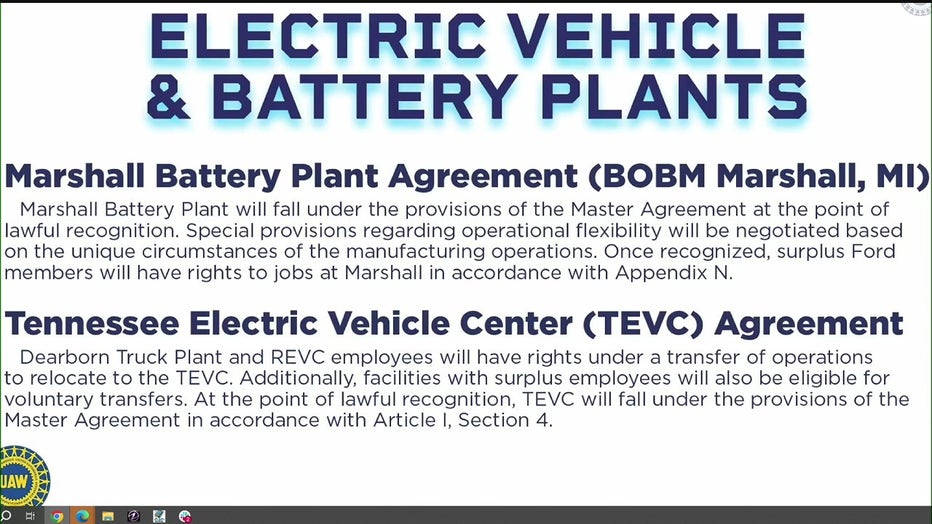UAW celebrates contract with Ford, including EV plant victories
UAW dives into contract with Ford: here's what's in it
The UAW said its newest contract with Ford was an historic one and included several gains for workers, from wage increases and the end to tiers to a major victory in the employment of union members two incoming battery plants.
(FOX 2) - UAW leadership on Sunday celebrated what it called an "inflection point" in the union's history, days after securing a tentative agreement with Ford.
Details of the union's contract include more than just a 25% wage increase for workers that, with cost-of-living adjustments included, add up to a 33% compounded increase in worker pay.
Notably, the deal with Ford includes plans to work in the automaker's incoming electric vehicle plants coming to Marshall, Michigan and Tennessee.
"This contract is a turning point," UAW President Shawn Fain said in a Facebook live stream Sunday. He also alluded to plans to expand the union.
By the next time the union negotiates with automakers, it won't be with the Big 3, but the Big 4 or Big 6, Fain said.
"This is a call to action to workers everywhere to organize and fight for a better life," he said.
The contract with Ford will expire on April 30, 2028. Fain said the date was selected so the union could strike on May 1, also known as International Workers Day.
Bonuses, profit-sharing, and right to strike
When wage increases and inflation accounted for, union workers could make $42.60 an hour at the top rate.
That figure includes a 25% wage increase and an estimated $8,800 increase from cost-of-living adjustments after three years of work. It previously took eight years for a union worker to reach top pay status at Ford.
The wage increases will start automatically for Ford workers with 11% boost as soon as the deal is ratified by members. It'll climb 3% each year after that with a 5% increase in the final year of the contract.
A ratified contract will also deliver a $5,000 bonus to workers and the immediate transition of all temporary workers to permanent status for those that have worked 90 days.
All other temporary workers will receive permanent status after nine months of work.
Ford also agreed to allow the UAW to strike every one of the automaker's plants at the same time if the company closed one of its plants.
Fain also said the Ford agreed to allowing a retirement bonus - its first in 16 years.
Ford contract includes battery plants
Currently under construction, the Marshall Battery Plant will one day employ union members under the provisions of its Master Agreement.
There are also plans for union workers at Dearborn Truck and the Rouge factory to transfer to operations at the Tennessee Electric Vehicle Center once it opens.
While electric vehicles have hung over negotiations as the Detroit Three continue leaning further into transitioning its fleet to battery-powered cars and trucks, few details about what they mean for the UAW have been released.

The union's deal with Ford includes battery plants being roped into the union's National Master Agreement.
During negotiations, Fain said GM had agreed to include its future EV plants under the UAW's Master Agreement.
Both the union and Ford are expected to continue negotiating how to rope the next-generation plants into the UAW's masterplan.
GM still without a contract
General Motors is the only automaker without a contract with the UAW, which last night hit the company with another strike at a facility in Tennessee.
The walkout at GM's Tennessee plant could inflict additional financial pain on the automaker as the Spring Hill factory is the company's largest in North America. Four-thousand union members run the plant, which builds the company's Cadillac models.
Already the historic strike has levied billions of dollars in lost wages and unfinished vehicles at plants and parts facilities around the U.S. Before reaching a tentative deal with Ford, the number of striking union workers peaked at 46,000.
UAW contract deal details
Notably, the deal with Ford includes plans to work in the automaker's incoming electric vehicle plants coming to Marshall, Michigan and Tennessee.


